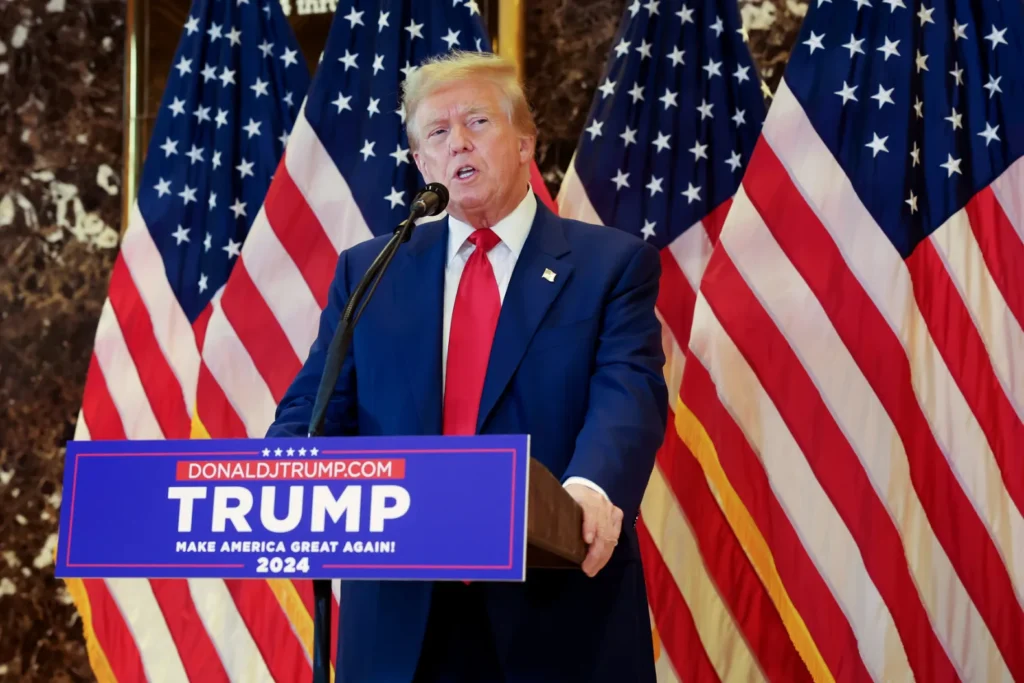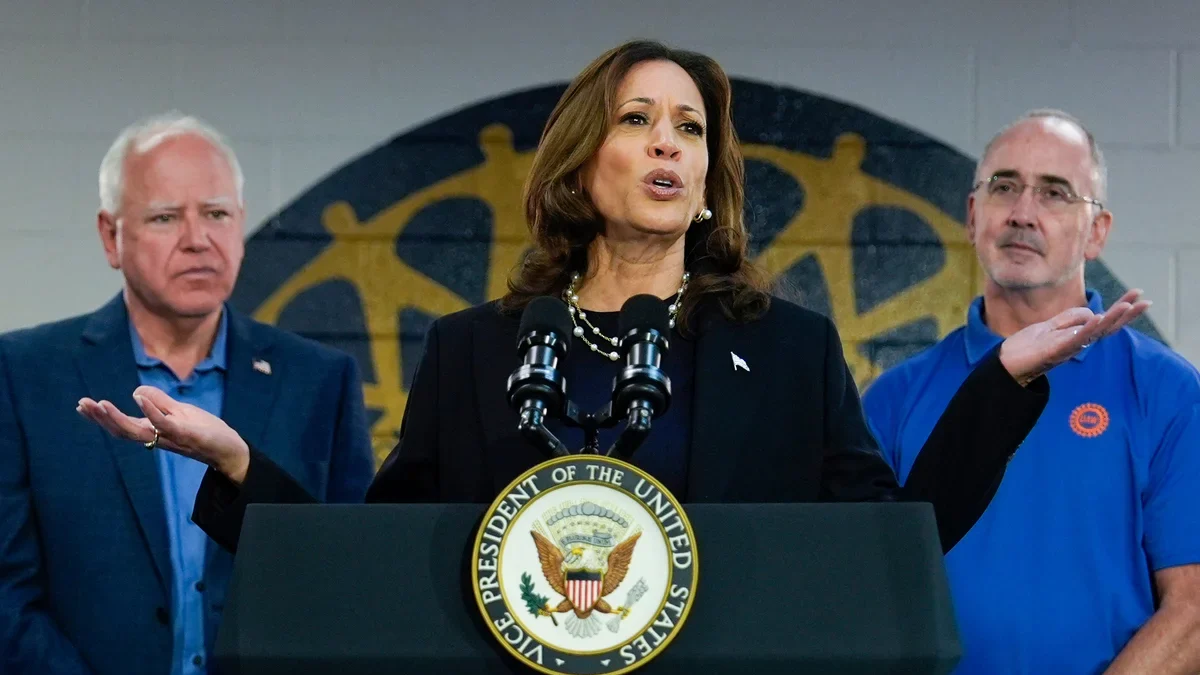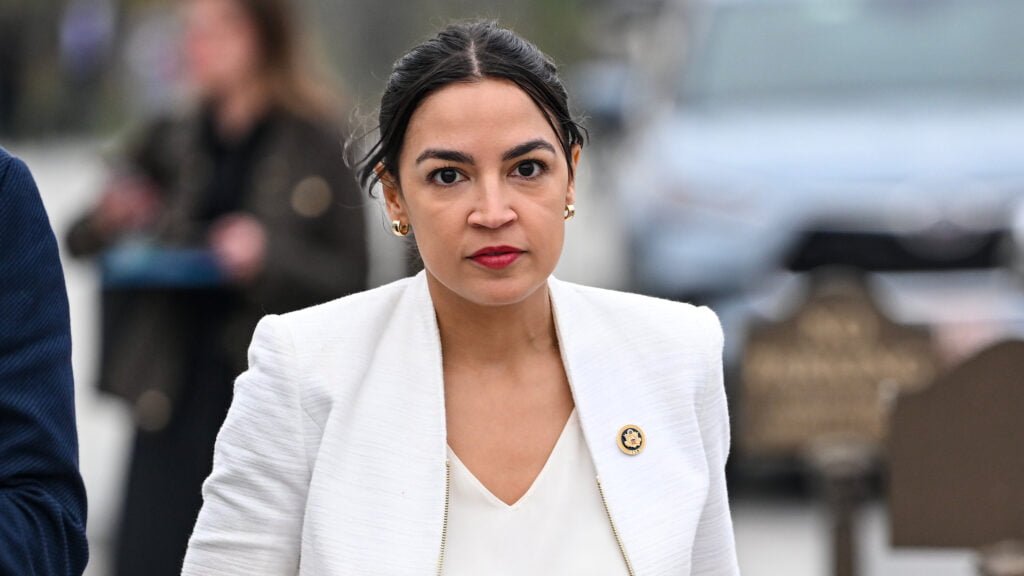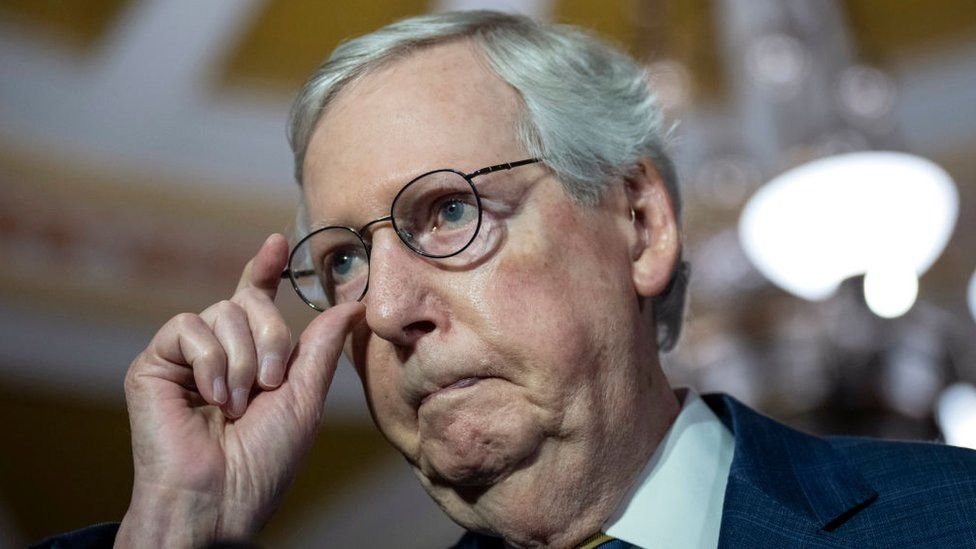As the 2024 election looms on the horizon, a handful of influential political figures stand poised to shape America’s future. From the polarizing presence of Donald Trump to the rising star of Kamala Harris, and the strategic maneuvering of Robert C. O’Brien, these key players are set to leave an indelible mark on the nation’s political landscape. Their current roles, policy positions, and potential impact on the upcoming election and beyond warrant close examination. This analysis delves into the top five political figures who will play pivotal roles in determining the course of American politics, providing readers with a comprehensive understanding of the forces at work at this critical juncture of U.S. history.
Donald Trump: The Former President Still Casts a Long Shadow

A Controversial Figure in American Politics
Despite losing the 2020 election by over 7 million popular votes, Donald Trump remains a dominant force in American politics. As a former president, Trump is constitutionally eligible for a second term, a fact that keeps him at the forefront of political discussions. His influence extends far beyond traditional party lines, shaping the Republican landscape and stirring debate across the nation.
Undermining Democratic Institutions
Some sociologists argue that Trump’s continued influence poses a significant threat to democratic institutions. His persistent claims of election fraud, despite lack of evidence, have eroded trust in the electoral process. This narrative has led to a polarization that extends beyond typical partisan divides, potentially weakening the foundations of American democracy.
The Power of Social Media and Public Perception
Trump’s ability to dominate headlines and shape public discourse remains unparalleled. Although his blog, “From the Desk of Donald J. Trump,” struggled to gain traction and was shut down after just 29 days, his influence on social media platforms continues to be significant. Even when banned from major platforms, his statements find ways to circulate widely, demonstrating the enduring power of his political brand.
Legal Challenges and Future Prospects
The former president faces numerous legal challenges, including potential disqualification under Section 3 of the 14th Amendment. While the Supreme Court ruled against using this provision to remove Trump from Colorado’s primary ballot, the decision left many questions unanswered about the scope and application of Section 3. These ongoing legal battles continue to shape Trump’s political future and the broader landscape of American politics.
Kamala Harris: Biden’s VP and Potential Successor

A Historic Figure in American Politics
Kamala Harris has made history as the first woman, first Black person, and first person of South Asian descent to serve as Vice President of the United States. President Joe Biden endorsed her as his running mate in the 2020 presidential election, solidifying her position as a key figure in the Democratic Party. Her groundbreaking role has positioned her as a potential frontrunner for future presidential nominations.
A Strong Democratic Contender
Recent polls indicate that Harris has secured substantial support within the Democratic Party. A ranked-choice poll conducted by FairVote shows that she is the consensus choice among Democrats if President Biden were to withdraw from the race. This strong backing suggests that Harris has effectively built a coalition of support during her tenure as Vice President.
Potential Running Mates and Future Prospects
As discussions about the 2024 election intensify, speculation has grown about potential running mates for Harris, should she become the Democratic nominee. Several prominent figures have been mentioned, including:
- North Carolina Governor Roy Cooper
- Arizona Senator Mark Kelly
- Kentucky Governor Andy Beshear
- Transportation Secretary Pete Buttigieg
- Illinois Governor JB Pritzker
- Pennsylvania Governor Josh Shapiro
Each of these potential candidates brings unique strengths and regional appeal that could complement Harris on a national ticket. The selection of a running mate would be crucial in balancing the ticket and appealing to a broad spectrum of voters across the country.
Challenges and Opportunities
While Harris enjoys significant support within the Democratic Party, she faces challenges in broader national polls. Some Democrats have expressed concerns about her performance on key issues such as immigration. However, her historic position and the backing of influential party figures position her as a formidable candidate for future leadership roles within the party and potentially on the national stage.
Mitch McConnell: The Veteran Republican Senate Leader

A Legacy of Leadership
Mitch McConnell, the longest-serving Senate Republican leader in history, has been a dominant force in American politics for decades. Elected to the Senate in 1984, McConnell has represented Kentucky longer than any other senator from the state. His tenure has been marked by strategic maneuvering and a steadfast commitment to advancing Republican priorities, including tax cuts and deregulation.
Shaping the Supreme Court
One of McConnell’s most significant achievements has been his role in shaping the federal judiciary. During the Trump administration, he played a pivotal part in confirming three conservative justices to the Supreme Court, fundamentally altering the ideological balance of the nation’s highest court for generations to come.
Navigating a Changing Political Landscape
Despite facing criticism from the more conservative, Trump-aligned wing of the party, McConnell has remained a powerful and influential figure in the Senate. He has skillfully navigated the changing dynamics within the Republican Party, balancing traditional conservative values with the populist surge led by former President Donald Trump.
McConnell’s leadership style has been characterized by his strategic acumen and tactical skills, which have allowed him to maintain his position of influence even as the party has evolved around him. His ability to secure federal funding and resources for Kentucky as a senior member of the Senate Appropriations Committee has further solidified his standing within the GOP.
As McConnell prepares to step down from his leadership role in November 2024, his legacy as a key figure in shaping America’s political landscape remains undeniable, leaving an indelible mark on the Republican Party and the nation as a whole.
AOC: A Rising Star of the Progressive Left

The New Face of Progressive Politics
Alexandria Ocasio-Cortez (AOC) has emerged as a formidable force in American politics, embodying the aspirations of a new generation of progressive leaders. As the youngest woman ever elected to Congress, AOC has quickly become a symbol of change and a voice for marginalized communities. Her rapid ascent from bartender to congresswoman has captivated both supporters and critics alike, making her a central figure in shaping the future of the Democratic Party.
A Model for Diverse Progressive Movement
AOC’s politics provide a blueprint for a more inclusive and diverse progressive movement. Her platform, which includes Medicare for All, tuition-free public college, and a federal jobs guarantee, resonates with a broad coalition of voters. By addressing issues like racial injustice, climate change, and economic inequality, AOC has successfully bridged the gap between traditional left-wing concerns and the priorities of younger, more diverse constituents.
Challenging the Democratic Establishment
Despite her popularity among progressives, AOC’s relationship with the Democratic Party establishment remains complex. Her willingness to challenge party leadership on issues like climate policy and healthcare has sometimes put her at odds with more moderate Democrats. However, this approach has also energized a base of supporters who believe the left gains nothing by compromising its core principles. As the 2024 election approaches, AOC’s influence on the party’s direction and her ability to mobilize young voters will be crucial factors in shaping America’s political landscape.
Robert C. O’Brien: Trump’s National Security Advisor Weighs His Next Move

From Hostage Affairs to National Security
Robert C. O’Brien’s ascent to the role of the 27th United States National Security Advisor in 2019 marked a significant shift in his career trajectory. Before this appointment, O’Brien served as the Special Presidential Envoy for Hostage Affairs, where he honed his diplomatic skills. His transition to National Security Advisor under President Donald Trump placed him at the epicenter of critical foreign policy decisions, shaping the administration’s approach to global affairs.
Advocating “Peace Through Strength”
O’Brien’s tenure as National Security Advisor was characterized by his advocacy for a “Trumpian restoration of peace through strength” in US foreign policy. This philosophy manifested in several key areas:
- A heightened focus on China, criticizing Beijing’s actions in Hong Kong and the South China Sea
- Involvement in brokering the Abraham Accords, normalizing relations between Israel and several Arab nations
- Proposing a plan to sever US-China economic ties, including a controversial suggestion to send the entire US Marine Corps fighting force to Asia
Shaping America’s Future
As the 2024 election approaches, O’Brien’s influence on American politics remains significant. He has emerged as a potential “dark horse” contender for the Republican presidential nomination, though he has not made any definitive statements about running. His views on US-China relations and military posture in Asia continue to be closely watched, particularly given the possibility of a return to the White House for former President Trump.
In a recent interview, O’Brien suggested that a second Trump administration would likely take a tougher stance on issues like China, Iran, and the war in Ukraine compared to the current Biden administration. As America navigates an increasingly complex global landscape, O’Brien’s expertise and policy positions may play a crucial role in shaping the nation’s future foreign policy direction.
The Issues Driving the 2024 Election
As the 2024 presidential race heats up, a complex tapestry of issues is shaping the political landscape. Voters find themselves increasingly polarized on hot-button topics, while economic concerns remain at the forefront of many Americans’ minds.
Divisive Social and Foreign Policy Issues
The electorate remains deeply divided on several key issues. Abortion rights continue to be a flashpoint, with candidates staking out positions across the spectrum. Climate change policy is another area of contention, with stark differences between those prioritizing environmental protection and those focused on economic impacts. Foreign policy debates are equally spirited, particularly regarding America’s role on the global stage and relationships with key allies and adversaries.
Economic Concerns Take Center Stage
While social and foreign policy issues generate passionate debate, economic concerns dominate many voters’ priorities. A recent poll found that inflation and rising prices are the top concerns for a quarter of Americans. This reflects ongoing anxiety about the cost of living, wage stagnation, and economic inequality. Candidates are responding with a range of proposals on taxes, job creation, and social safety net programs.
A Multifaceted Policy Landscape
The 2024 election is shaping up to be one of the most policy-rich in recent memory. Leading candidates have already issued statements on over 40 distinct policy areas spanning domestic, foreign, and economic realms. This breadth of issues reflects the complex challenges facing the nation and the diverse priorities of the American electorate.
As voters navigate this intricate policy landscape, they’ll be looking to candidates to articulate clear visions for America’s future. The ability to effectively communicate and implement solutions to these myriad challenges may well determine who occupies the White House come January 2025.
Battleground States to Watch in 2024
The 2024 U.S. presidential election is shaping up to be a nail-biter, with a handful of swing states poised to determine the outcome. According to recent polls, six key battleground states – Arizona, Georgia, Michigan, Nevada, Pennsylvania, and Wisconsin – are expected to play a pivotal role in deciding who will occupy the White House.
The Razor-Thin Margins
These swing states are notorious for their tight races. In 2020, President Biden’s victory margins in Arizona, Georgia, and Wisconsin were all less than 1%. With such narrow margins, even small shifts in voter preferences or turnout could tip the scales in 2024.
Key Issues Driving the Battle
Each battleground state has its unique concerns:
- In Arizona, immigration and abortion access are hot-button issues.
- Georgia’s large African-American population could be crucial for mobilization efforts.
- Michigan has seen backlash over foreign policy stances, particularly regarding Israel.
- Nevada’s slow economic recovery post-COVID is a major concern for voters.
- Pennsylvania residents are grappling with high inflation and rising grocery prices.
- Wisconsin remains a toss-up, where third-party candidates could play a significant role.
These state-specific issues are likely to shape campaign strategies and voter decisions in the coming months.
The Electoral College Equation
With 538 total Electoral College votes up for grabs, a candidate needs 270 to clinch the presidency. These six swing states collectively hold 85 electoral votes, making them the potential kingmakers of the 2024 election. Campaigns will undoubtedly pour resources into these crucial battlegrounds, knowing that victory here could mean the difference between winning and losing the White House.
As the election approaches, all eyes will be on these swing states, where a relatively small number of voters could ultimately decide the future direction of the nation.
Fundraising and Finances Shape the Race
Record-Breaking Campaign Coffers
The 2024 election cycle is shaping up to be the most expensive in U.S. history, with political campaigns amassing unprecedented war chests. Between January 2023 and April 2024, U.S. political campaigns collected a staggering $8.6 billion, setting the stage for a fiercely competitive race. This astronomical figure underscores the pivotal role that fundraising plays in shaping the political landscape and influencing election outcomes.
Biden’s Fundraising Juggernaut
President Joe Biden’s campaign has emerged as a formidable fundraising force. His joint fundraising committee raised an impressive $176 million for the campaign, demonstrating the incumbent’s ability to mobilize financial support. This substantial sum provides Biden with a significant advantage in terms of campaign resources, allowing for extensive advertising, grassroots organizing, and voter outreach efforts.
The Dominance of PACs and Party Committees
Perhaps the most striking aspect of the 2024 election’s financial landscape is the outsized influence of Political Action Committees (PACs) and party committees. Over 75% of the funds raised for the 2024 election came from these entities, highlighting their growing importance in the political arena. This trend raises questions about the role of big money in politics and its potential impact on the democratic process.
While individual donors remain crucial, the overwhelming dominance of PACs and party committees in fundraising efforts suggests a shift in the power dynamics of campaign finance. This concentration of financial resources in the hands of organized political entities could have far-reaching implications for campaign strategies, policy priorities, and ultimately, the outcome of the election.
As the race intensifies, candidates will need to navigate this complex financial landscape, balancing the need for substantial funding with the public’s growing concerns about the influence of money in politics. The ability to effectively raise and allocate these vast sums may well prove to be a decisive factor in determining America’s political future.
Election 2024 FAQs: Your Top Questions Answered
Voter Registration Deadlines
As the 2024 General Election approaches, many Americans are seeking clarity on voter registration procedures. In Arizona, a key battleground state, voter registration for the 2024 General Election opens 30 days after submission. This timing is crucial for residents planning to participate in what promises to be a pivotal election.
Chicago’s Inclusive Voting Process
Chicago, one of America’s largest cities, is taking steps to ensure widespread participation in the democratic process. All eligible voters in Chicago can take part in the November 5, 2024 Presidential General Election. This inclusive approach aims to maximize voter turnout and ensure diverse representation at the polls.
Clark County’s Online Registration Update
While many states are embracing digital solutions for voter registration, some regions are facing temporary hurdles. Online voter registration outside of Clark County is currently disabled during the 2024 election upgrade. This temporary measure highlights the ongoing challenges of modernizing election infrastructure while maintaining security and accuracy.
Key Considerations for Voters
As we approach Election 2024, it’s crucial for voters to:
- Check their registration status regularly
- Be aware of state-specific deadlines and requirements
- Stay informed about any changes to voting procedures in their area
The Importance of Early Preparation
With the potential for high voter turnout and the implementation of new voting technologies, early preparation is key. Voters should familiarize themselves with their local election offices, understand the various voting methods available (such as mail-in ballots or early voting), and keep abreast of any updates to election procedures.
By staying informed and proactive, American voters can ensure their voices are heard in this critical election that will shape the nation’s future.
Conclusion
As the 2024 election approaches, these five political figures stand poised to significantly influence America’s trajectory. Their diverse backgrounds, policy positions, and leadership styles will shape the national dialogue and voter choices. While the political landscape remains fluid, Trump, Harris, O’Brien, and their counterparts will undoubtedly play pivotal roles in determining the country’s direction. As voters navigate this complex terrain, understanding these key players’ motivations and potential impacts becomes crucial. The coming months will reveal how these political heavyweights maneuver, align, and compete – ultimately molding the future of American democracy and governance for years to come.










Discussion about this post